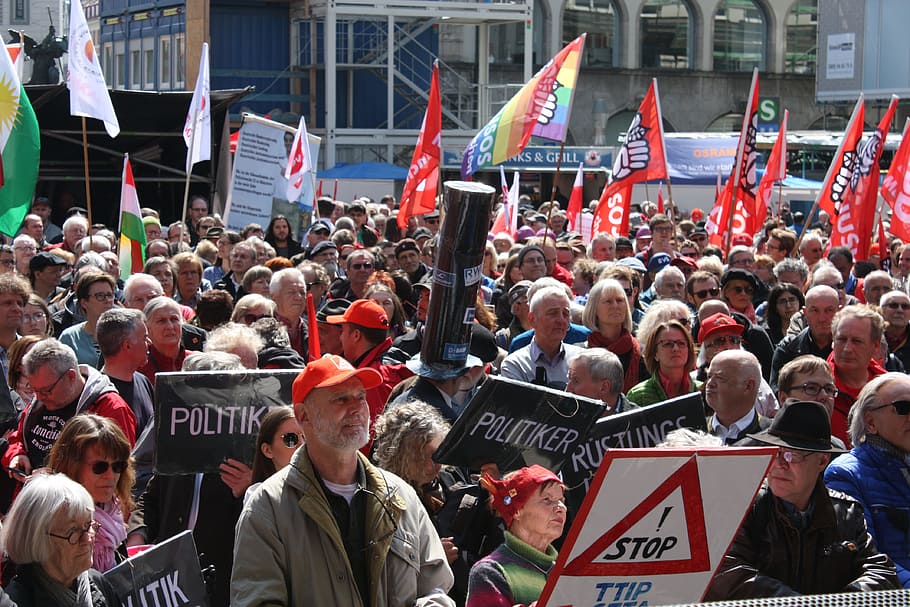In today’s News and Commentary, a Massachusetts fire union protests 660+ days without a contract, the NLRB rules that a Tesla service center violated labor law by restricting employees’ communication regarding salary and working conditions, and over 160 countries celebrate May Day with rallies and protests calling for better labor conditions.
Several Massachusetts towns have experienced recent contract disputes with their fire unions, but none running longer than the dispute between Westwood Fire Union and town officials. The fire union in Westwood, a Boston suburb, has gone 669 days without a contract. This weekend, firefighters picketed outside the fire house demanding a fair and equitable salary increase, in line with agreements the town has made with the police and teachers unions. Residents will vote on next year’s budget today. The budget proposal includes a 3.4% salary increase for the fire department and a 5.8% raise for teachers.
Tesla violated U.S. labor law according to yet another proceeding before the NLRB. A Tesla service center in Florida was accused of restricting employees from discussing pay and working conditions with each other or reporting complaints to management. In 2021, workers complained that new hires were earning more than existing workers. The service center responded by instructing facility employees not to share information about their salary. One of the technicians who submitted a complaint was fired a few weeks later. The April 26th ruling comes with a slap on the wrist for the company. Tesla has been ordered to cease and desist from violating the rights of workers. The service center will be required to post a notice of the violation and email the notice to employees.
Today, over 160 countries observed May Day, a celebration of labor rights. Workers and activists in countries across Europe, South America, and Asia took to the streets to demand better working conditions. Unions in France marched to protest the recent efforts to increase the retirement age from 62 to 64. South Korea’s May Day rallies returned to their pre-pandemic size, with workers demanding an increased minimum wage and reduced working hours. Spain saw over 70 marches, with demands from both blue-collar and white-collar workers, including moving to a 4-day work week and eliminating the requirement for lawyers to be on call 365 days a year. Protesters in Turkey were detained and prevented from entering Istanbul’s main square, while journalists attempting to film the detainments were themselves detained. Meanwhile, the Cuban government was forced to cancel its May Day parade due to severe fuel shortages.







Daily News & Commentary
Start your day with our roundup of the latest labor developments. See all
June 30
Antidiscrimination scholars question McDonnell Douglas, George Washington University Hospital bargained in bad faith, and NY regulators defend LPA dispensary law.
June 29
In today’s news and commentary, Trump v. CASA restricts nationwide injunctions, a preliminary injunction continues to stop DOL from shutting down Job Corps, and the minimum wage is set to rise in multiple cities and states. On Friday, the Supreme Court held in Trump v. CASA that universal injunctions “likely exceed the equitable authority that […]
June 27
Labor's role in Zohran Mamdani's victory; DHS funding amendment aims to expand guest worker programs; COSELL submission deadline rapidly approaching
June 26
A district judge issues a preliminary injunction blocking agencies from implementing Trump’s executive order eliminating collective bargaining for federal workers; workers organize for the reinstatement of two doctors who were put on administrative leave after union activity; and Lamont vetoes unemployment benefits for striking workers.
June 25
Some circuits show less deference to NLRB; 3d Cir. affirms return to broader concerted activity definition; changes to federal workforce excluded from One Big Beautiful Bill.
June 24
In today’s news and commentary, the DOL proposes new wage and hour rules, Ford warns of EV battery manufacturing trouble, and California reaches an agreement to delay an in-person work mandate for state employees. The Trump Administration’s Department of Labor has advanced a series of proposals to update federal wage and hour rules. First, the […]